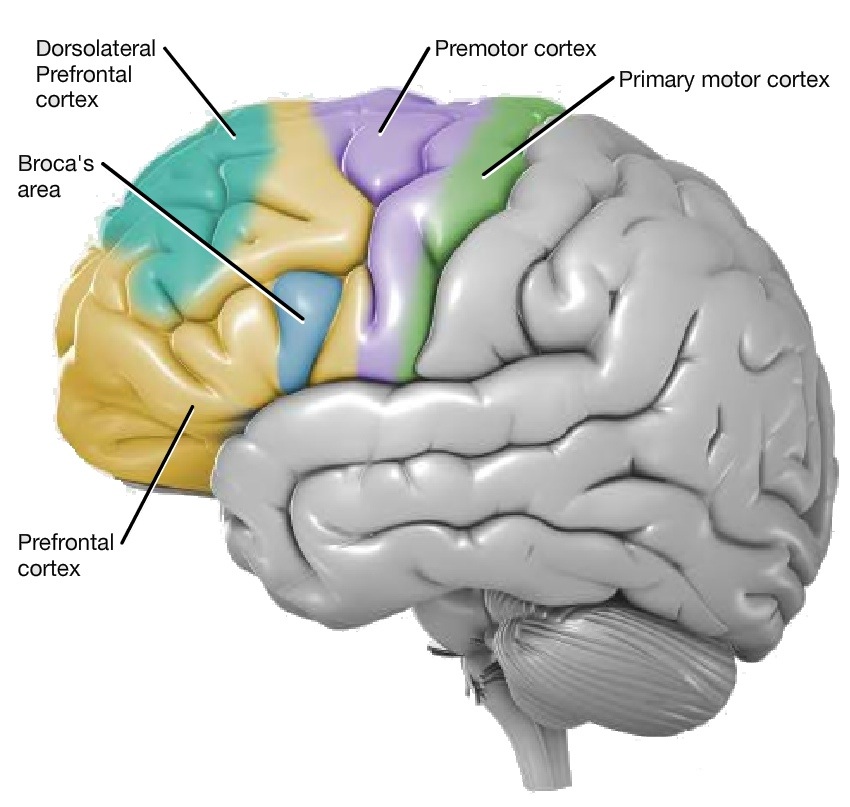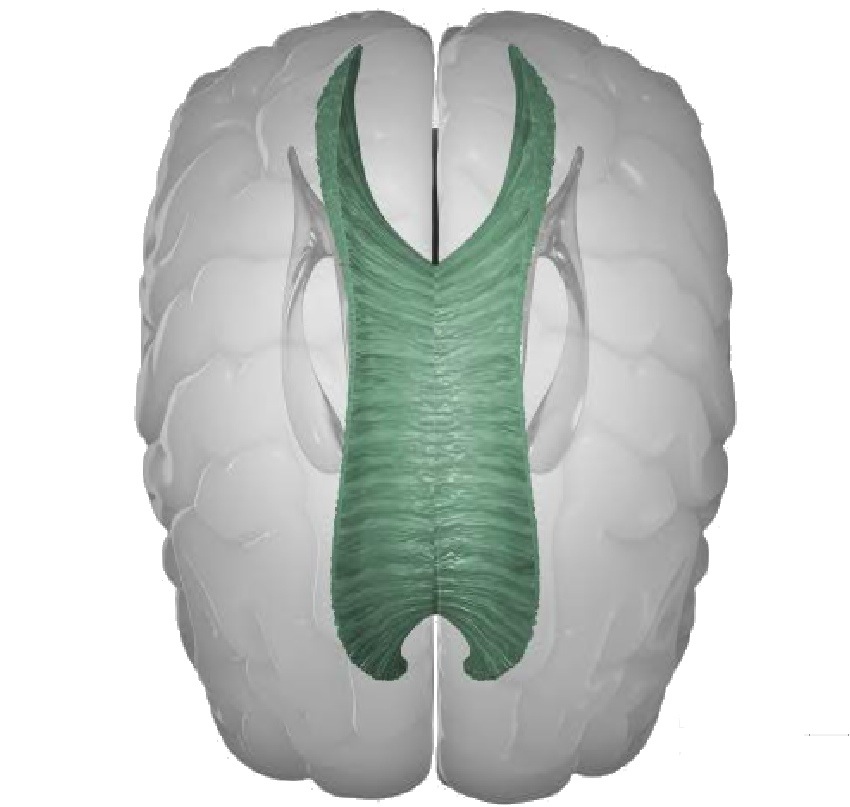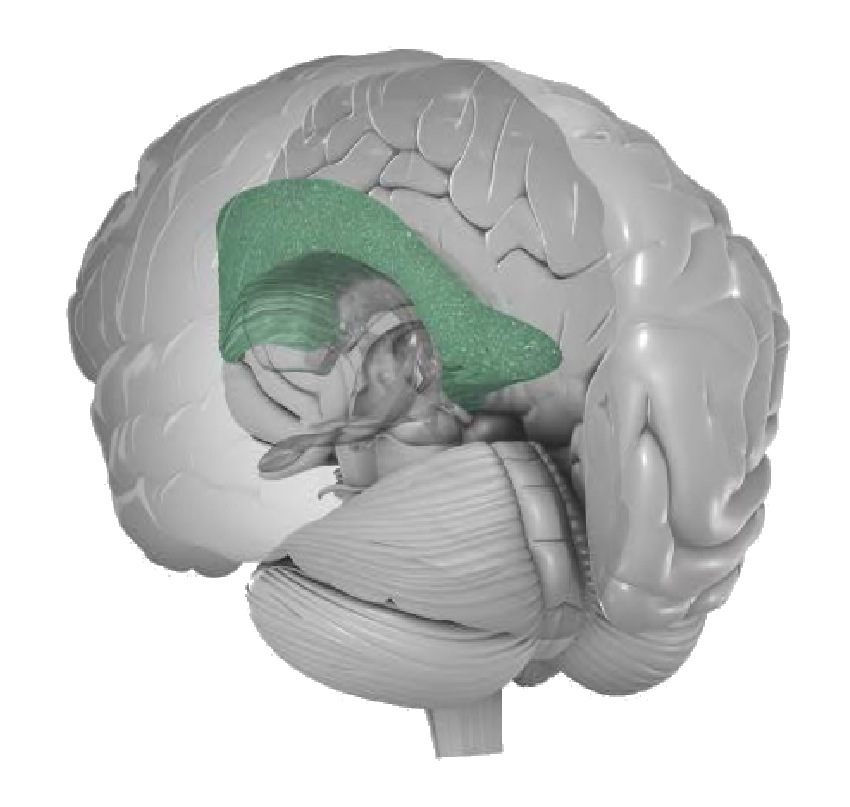"The mind has exactly the same power as the hands: not merely to grasp the world, but to change it."
—Colin Wilson
Of particular interest to this research are the frontal lobes, and the corpus callosum which connect the two cerebral hemispheres.
The frontal lobes (also called the frontal cortex) are believed to play an important role in the development of new, stable and well-balanced behaviours and thinking (so long as the cerebral hemispheres are communicating with each other well and in a balanced way) which is especially important during early childhood. The frontal lobes are also critical to formulating our thoughts and dreams (1) through patterns derived from the cerebral hemispheres (and probably the hippocampus region) during problem-solving, or when the brain needs to store important information in certain parts of the cerebrum for longer term use.


As for the corpus callosum, this great bundle of nerves seem to be designed to shuttle information back and forth between the left- and right-cerebral hemispheres during problem-solving (i.e. when sifting out patterns and bringing them together in certain specific or creative combinations and permutations for formulating our thoughts and with it the potential for new ideas or insights into a problem).


Although there would appear to be no immediate and obvious physical link between the frontal lobes and the corpus callosum, brain scans made with Positive Emission Tomography (PET) suggests the corpus callosum is often busy transferring information between the cerebral hemisphere whenever the frontal lobes are active.
One of the classic ways of knowing how important your frontal lobes are in the formation of your thoughts and dreams (before they are brought down to the more primitive parts of the brain where they are turned into reality through our behaviour) is to experience the pain associated with an increase in blood flow to certain parts of the brain during migraines, headaches or a flu (or cold). People often report how visualisation, thinking and dreaming have a habit of increasing the sensation of pain or some kind of pressure in the frontal cortex region. Whereas activities that require no thinking but instead focus on looking at paintings and other visual information can increase blood flow and sometimes a little discomfort at the back of the head. However, if we learn to relax the mind and not observe things in great detail (i.e. just live in the here-and-now moment) it seems to have an opposite and more soothing effect on the frontal lobes.
The removal, damage or reduced functional capacity of the frontal lobes will probably make it difficult for a person to produce a creative and rational (or "balanced") thought generated by the L- and R-brain. (2) It may also be difficult to associate a thought with an emotion to help improve one's own memory. And perhaps the ability to visualise will also be seriously hampered by the loss of the frontal lobes.
In essence, learning becomes more difficult without the frontal lobes intact and working properly.
In fact, the frontal lobes are intimately linked to our primary emotions. Without this link and the brain will find it difficult to learn and record in memory new patterns needed for modifying behaviour. Thus the removal of these lobes will probably make it extremely difficult to relate our new thoughts (if any) to our feelings as required for effective learning, to recall emotionally-charged events in memory, and to modify our existing behaviours into something new and more balanced especially in times when we must survive in a new and unfamiliar situation.
Although learning is still achievable with the loss of this part of the brain, it often requires considerable effort, and the ability to concentrate on tasks for long-periods of time is probably also seriously hampered.
For a fully-grown adult, the loss of the frontal lobes is not considered a major problem other than not being able to recognise and/or show an appropriate emotional response to a new situation, for example, or to recall certain emotional events in the past, and the difficulty in trying to think on one's own without the assistance of others can be exacerbated. But for a child who has not problem-solved enough in life and therefore has not acquired sufficient individualised and reasonably balanced behaviours, the loss can be serious and could lead to what is known as Attention Deficit and Hyperactivity Disorder (ADHD), and eventually to extremely imbalanced L-brain and/or R-brain behaviours in adulthood including schizophrenia. (3)
Or if the brain realises the deficit and tries to compensate during intense problem-solving by turning other parts of the remaining cerebrum to perform the same basic functions of the frontal cortex, there may be strong visual and/or auditory delusions in those new areas of the cerebrum where problem-solving may take place. People who suffer these kinds of delusional or psychotic episodes are described by psychologists as schizophrenics (now dubbed as the "cancer of psychiatry").(4)
For people with frontal lobes still intact, the best way to look after them is for the frontal lobes to be made to concentrate on an emotionally interesting and useful thinking task for at least 15 minutes every day (5) followed by adequate rest. Or for adult men with limited frontal lobes development (usually those ending up in prisons because they were not loved and supported during learning and given easy access to quality education), fulfilling at least one long-term challenge or hobby of interest to them and having regular sleep is crucial to improving their ability to concentrate on certain tasks and becoming more balanced individuals using their frontal cortex (6). This is called behavioural and cognitive stability learning therapy.
The implications of this rather important technique means that the entire Western education system with its emphasis on learning many different things in a very short space of time over so many hours of a day through homework may have to undergo a major overhaul. We need to think about how people actually learn, especially for young boys who are usually slower to mature and achieve reasonable balance and good thinking powers compared to girls of a similar age.
For example, many Western educationalists believe that constant change (the use of fast editing in television programs etc), non-stop stimulation from different areas without adequate rest and time to think and question everything, continuously being competitive and measuring performance and comparing them with others, and in doing as many activities as possible on a daily basis in an attempt to stimulate the mind is the best way to learn. And for some governments, doing any type of job throughout the lifetime of an individual is also seen as best for everyone. Some people call this approach "multi-skilling" or the "Jack of all trades, but an expert at none". But this reduces thinking powers in the brain.
If every human being is to effectively solve problems through good thinking powers (rather than reacting to things and trying anything until it works) together with a greater sense of stability and balance in their behaviours, the education system must simplify its education, stop focussing on grading kids as if trying to prove who is better than whom, teach people how to learn for themselves, let people decide what areas they want to learn and achieve in their life, and allow adequate time to concentrate on one or two specific tasks for long periods of time.
The stable approach to learning requires a much more simplified and self-guided approach rather than an all out assault at learning many things as possible in a short space of time and forcing people to accept whatever they are given without question.
By applying this stable method of learning a few things, greater development of the frontal cortex will be achieved and more effective problem-solving will be possible.
As one wise person said: "The quickest way to do many things is to do one thing at a time." (7)
And as Mr Steve Pollock, president of San Francisco-based WetFet.com, said:
"[Too many times] people make poor choices and don't really access what they want out of a career." (8)
As one article in The Straits Times dated 7 July 2001 stated on page R1:
"Before making a decision regarding a job offer, take the time to decide if it is the right choice for you." (9)
If we do not allow young minds the time to relax, be themselves, think and concentrate on one thing at a time (10) and something that interests them, children are likely to develop problems like ADHD (which has reached epidemic proportions in many developed countries according to the ABC science program Quantum on 31 August 2000) and perhaps even more severe forms of mental illness.
Actually it would not be surprising if much of this poor development of the frontal cortex is likely to be the root cause for much of the world's greatest human problems.
As far as the grading system is concerned, the following quote from Deputy Principal Judy Aulich of Giralang, Canberra, should be enough to end this nonsense in the Western education system if we are able to learn anything for ourselves:
"Do parents really want their children graded A to E at everything they do from the minute they start school? Their progress in everything plotted against every other child in the class? When my three kids went to school I never doubted that they would learn to read in time, just as I never doubted that they would learn to walk and talk.
'One had the basics of reading pretty much nailed before she went to school, another was not too bad by the end of Year 1 and my other child has struggled for all of his life to read out loud.
'Definitely an E for him at the end of Kindy.
'Several years later there are quite a few degrees between them.
'Oh, and the one with the E in Kindy? He has an honours degree in Law.
'What possible good would competitive grading have achieved, at such a young age? What potential for harm!" (The Canberra Times: Grading degrading (Letters to the Editor). 1 October 2005, p.B8.)
NOTE: R-wing governments would prefer to see a grading system, especially in college and universities as it would help them and other employers select the students they want to employ and where they should go. Assuming the economic system created by governments and employers is balanced and needs to be maintained, this is the only way they can categorise people to achieve certain goals.